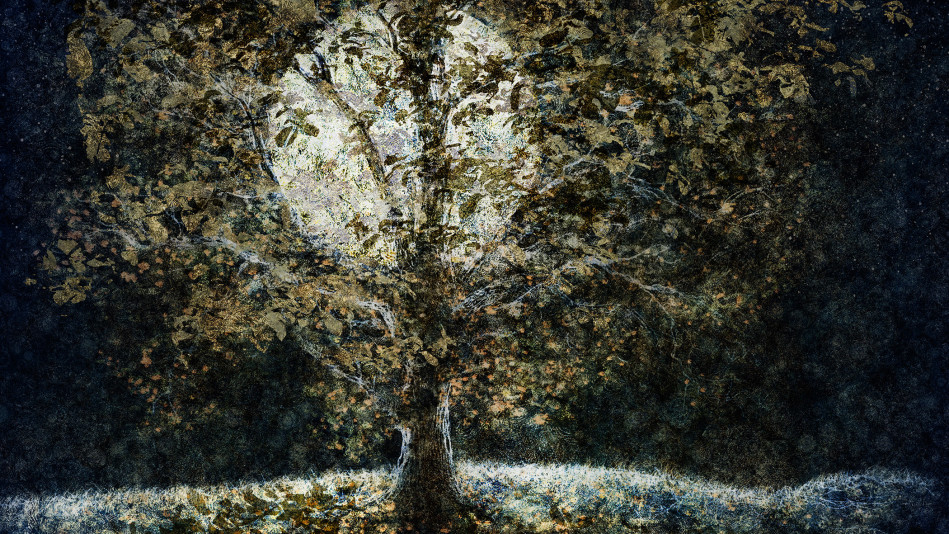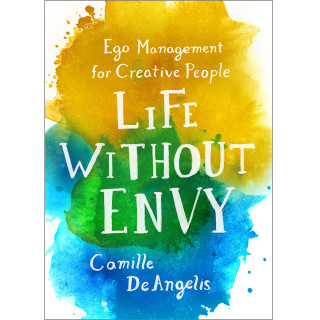2 Pernicious Fantasies Standing Between You and Who You're Meant to Be
The author of Life Without Envy reveals the two words that hold us back from realizing our potential—and our dreams.

Illustration: Andrew Bret Wallis/Getty Images
There's something else Eckhart Tolle says that has stuck with me, and I suspect it will do you good to hear it too: "'Greatness' is a mental abstraction and a favorite fantasy of the ego."
This line makes me giddy every time I read it. If it doesn't ultimately matter how impressed other people are (or aren't) with our efforts, then what's left is absolute creative freedom.
"Greatness"—as we typically interpret it in this twisted, vapid culture of ours—is an illusion. We're forever confusing recognition with inherent value. If Leonardo had been preoccupied with painting a Last Supper scene that would last through the ages, he wouldn't have experimented with that weird mixture of oil and tempera on dry plaster. But he took that risk, got on with it, and made something the monks of Santa Maria delle Grazie would appreciate every time they sat down to eat.
The concepts of "greatness" and "mediocrity" are pernicious fantasies. Eradicate these words from your mind as if they were a virus, because in a sense, they are.
First let's consider the logical absurdity. "Who's in charge of measuring everyone else's achievements?" the psychologist Ellen Langer has asked. "Who made that yardstick?" Even if you can answer this rhetorical question—your mother, the executive at the record label, your high-school art teacher who thought she was doing you a favor by saying "you don't have it in you to be the kind of artist you want to be"—you have to admit that you are giving these people power and influence they do not intrinsically possess.
This isn't about comparing your career to someone else's, coming up short and feeling shitty about it. This pernicious fantasy affects us on the inside, tainting our personal lives, and our personal lives are our bedrock. The underlying issue here isn't mediocrity. It's a lack of humility. It's so tempting to dismiss my high school classmates who've gone the route of kids, mortgage, and 9-to-5 office jobs as "mediocre," and I'd be lying if I said I've never given into it. When we talk about wanting to be "great," we implicitly set ourselves above others. We see ourselves as chosen where others are not. And is there anything remotely honorable about narcissism?
I've recently been introduced to a new way of looking at the words ordinary and extraordinary. In this worldview—articulated by the philologist Franklin Edgerton by way of my Hinduism professor—an ordinary life is an unexamined life. In this paradigm, the plumber who watches "The Power of Myth" and discusses it with his wife over homemade pizza on a Saturday night is indeed living an extraordinary life, a life of questioning and delving for hidden meaning, of seeking (and finding) spiritual succor in even the most unlikely places. In this sense, true "greatness"—if we must use that word—lies in simply using what we've been given, of pushing our frontiers and redrawing our own borders. If I'm right—if human achievement lies in what I like to call manifesting the awesome rather than tapping one's inherent ability—then we all have the capacity for genius, even those whom traditional science and medicine have labeled abnormal or inadequate in some way. In this paradigm, mediocrity is a habit rather than a life sentence.
When I was very young I wanted to be a "great" novelist, but now I just think in terms of the next project, of how it will stretch and frighten me. If I draw a comparison, I measure who I am against who I could be, the person I can grow into if I remain willing, over a period of years, to stick out my neck day after day. If I don't illustrate my own stories, if I don't write with candor about my feelings of jealousy and inadequacy, if I don't someday stand up in front of a thousand people and speak articulately (despite my thundering heart) about all these topics of such critical importance to all of us—ego and humility and creativity and intuition—then I will have to look back on my career and acknowledge that it has been a mediocre one. This judgment will have nothing to do with anyone else's standards or opinions, and everything to do with my own.
 This excerpt is from Life Without Envy: Ego Management for Creative People by Camille DeAngelis. Copyright © 2016 by the author and reprinted by permission of St. Martin's Press, LLC.
This excerpt is from Life Without Envy: Ego Management for Creative People by Camille DeAngelis. Copyright © 2016 by the author and reprinted by permission of St. Martin's Press, LLC.
This line makes me giddy every time I read it. If it doesn't ultimately matter how impressed other people are (or aren't) with our efforts, then what's left is absolute creative freedom.
"Greatness"—as we typically interpret it in this twisted, vapid culture of ours—is an illusion. We're forever confusing recognition with inherent value. If Leonardo had been preoccupied with painting a Last Supper scene that would last through the ages, he wouldn't have experimented with that weird mixture of oil and tempera on dry plaster. But he took that risk, got on with it, and made something the monks of Santa Maria delle Grazie would appreciate every time they sat down to eat.
The concepts of "greatness" and "mediocrity" are pernicious fantasies. Eradicate these words from your mind as if they were a virus, because in a sense, they are.
First let's consider the logical absurdity. "Who's in charge of measuring everyone else's achievements?" the psychologist Ellen Langer has asked. "Who made that yardstick?" Even if you can answer this rhetorical question—your mother, the executive at the record label, your high-school art teacher who thought she was doing you a favor by saying "you don't have it in you to be the kind of artist you want to be"—you have to admit that you are giving these people power and influence they do not intrinsically possess.
This isn't about comparing your career to someone else's, coming up short and feeling shitty about it. This pernicious fantasy affects us on the inside, tainting our personal lives, and our personal lives are our bedrock. The underlying issue here isn't mediocrity. It's a lack of humility. It's so tempting to dismiss my high school classmates who've gone the route of kids, mortgage, and 9-to-5 office jobs as "mediocre," and I'd be lying if I said I've never given into it. When we talk about wanting to be "great," we implicitly set ourselves above others. We see ourselves as chosen where others are not. And is there anything remotely honorable about narcissism?
I've recently been introduced to a new way of looking at the words ordinary and extraordinary. In this worldview—articulated by the philologist Franklin Edgerton by way of my Hinduism professor—an ordinary life is an unexamined life. In this paradigm, the plumber who watches "The Power of Myth" and discusses it with his wife over homemade pizza on a Saturday night is indeed living an extraordinary life, a life of questioning and delving for hidden meaning, of seeking (and finding) spiritual succor in even the most unlikely places. In this sense, true "greatness"—if we must use that word—lies in simply using what we've been given, of pushing our frontiers and redrawing our own borders. If I'm right—if human achievement lies in what I like to call manifesting the awesome rather than tapping one's inherent ability—then we all have the capacity for genius, even those whom traditional science and medicine have labeled abnormal or inadequate in some way. In this paradigm, mediocrity is a habit rather than a life sentence.
When I was very young I wanted to be a "great" novelist, but now I just think in terms of the next project, of how it will stretch and frighten me. If I draw a comparison, I measure who I am against who I could be, the person I can grow into if I remain willing, over a period of years, to stick out my neck day after day. If I don't illustrate my own stories, if I don't write with candor about my feelings of jealousy and inadequacy, if I don't someday stand up in front of a thousand people and speak articulately (despite my thundering heart) about all these topics of such critical importance to all of us—ego and humility and creativity and intuition—then I will have to look back on my career and acknowledge that it has been a mediocre one. This judgment will have nothing to do with anyone else's standards or opinions, and everything to do with my own.
 This excerpt is from Life Without Envy: Ego Management for Creative People by Camille DeAngelis. Copyright © 2016 by the author and reprinted by permission of St. Martin's Press, LLC.
This excerpt is from Life Without Envy: Ego Management for Creative People by Camille DeAngelis. Copyright © 2016 by the author and reprinted by permission of St. Martin's Press, LLC.



